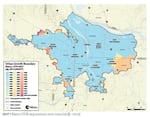
Urban Growth Boundary History.
Courtesy Metro
According to a recent L.A. Times op-ed, African-Americans are leaving Portland at a high rate — 11.5 percent from 2010 to 2014. This is part of a wider trend of African-Americans leaving "West Coast liberal hubs," where restrictive planning regulation is inhibiting growth, said Aaron Renn of conservative think tank The Manhattan Institute.
But Lisa Bates, an urban studies professor at Portland State University, told Dave Miller on Think Out Loud that there's no evidence this is true. She checked in with the Population Research Center at PSU, and in their opinion, this trend is not happening.
So why do census numbers show it is? Bates says the black population in Oregon is so small — 3.1 percent — that the margin of error on data like this is too big.
"That's where this noise in the data comes through," Bates said, "because the black population here is not very big, the margin of error — that plus or minus — is so large that it actually dwarfs that kind of change. So it might be that there's no change at all."
The Manhattan Institute pointed to liberal land-use policies — namely restrictive planning regulation — as the reason why African-Americans are leaving the West Coast for places that allow growth with less regulation, thus bringing down the price of housing.
But Bates says the real statistics don't back that up.
"What does it mean to have liberal land use policies? It's true that we have an urban growth boundary here in the Portland metro area ... [but] the way that we permit development, allow development, and the kinds of development we allow, is quite loose compared to most other metro areas when you look at rankings about how difficult it is to develop housing," Bates says. "We're actually pretty permissive."
Bates says census numbers do reveal a different dramatic movement in African-American voters, however. According to the neighborhood statistics from the Portland Housing Bureau, around 10,000 black people have moved from the central part of Portland to the edges. That's likely because housing prices are rising in the central city, and richer white people are moving in.
But, according to Bates, the rise in housing prices isn't directly due to the Urban Growth Boundary.
"The problem isn't that we don't have enough room on the land," Bates said. "The people who move here because they know of Portland as a place with great planning and walkable neighborhoods ... move in and then price out people who can't outbid them in the market, and that describes a lot of what's happened for African-Americans."
The city has already moved to address this by enacting the Preference Policy, which could help marginalized families with historic roots in North and Northeast Portland stay there by putting them in affordable housing.
Bates points out that even if African-Americans aren't leaving the city en mass, there are still worrisome trends for the black population of Portland.
"The other numbers that I would point to, which to me is much more to the point of a question of what's happening to black people, is numbers like our income disparities, our unemployment disparities, our home-ownership disparities ...." Bates says. "And when we think about black people in cities and what cities are good or not good for black people, we might care a lot about inequality and disparities in those cities."